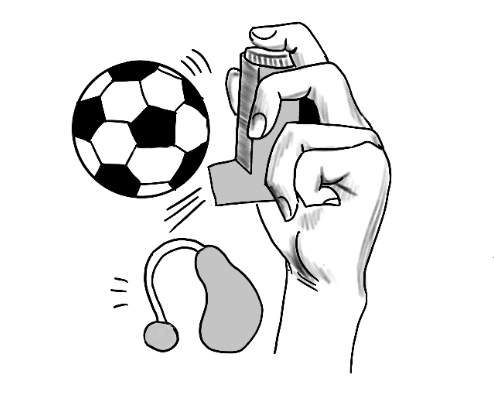
Junior Scarlett Bundy sprints across the field with vigor and vitality. As she runs, the green grass blurs beneath her feet; her arms pump in tandem with her lungs. Yet, because she is a part of the approximate 9.5% of teenagers with asthma in the U.S., according to the CDC, her lungs are assisted by an inhaler. Without it, asthma attacks would affect her physical performance.
“I’ll be […] in a soccer game, or flag football, or lacrosse, and I have to step out and I have to go take my inhaler,” Bundy said. “[Asthma] can hinder my ability sometimes to have endurance.”
Meanwhile, a chronic condition affects in-game communication for junior Mia Monsalve, who is hard of hearing and uses hearing aids. “It’s [..] a struggle sometimes, to like, hear the coach and hear their plays. […] I just hear lots of screaming going on from fans,” Monsalve said. Monsalve recounts a specific experience she had during a lacrosse game where she wasn’t aware that she had been yellow-carded due to not hearing the referee.
For most chronic conditions, student-athletes need a doctor’s clearance to begin playing, according to Assistant Athletics Trainer Steph Green. Specific conditions require extra communication with a student’s physician and coaches. “If a student has asthma, they have an asthma action plan that is agreed upon between them, their parents and the physician. So we just make sure that those action plans are followed,” Green said.
Action plans are written forms that also exist for other conditions like food allergies, anaphylaxis, seizure disorders and diabetes. On the form, students list out crucial information ranging from emergency contact numbers to details regarding the severity of their condition.
At the same time, student-driven communication with trainers is key for student-athletes with chronic conditions. “Most of the time, it’s self-monitored by the student and we just have to be kind of cognizant that they have these conditions so that if there were to be a flare-up or an incident, we know how to manage it,” Green said.
Monsalve further communicates with teammates about her condition and mentions that her team’s awareness is helpful. “I think that everyone’s aware on my school sports [teams] and my clubs of my hearing aids. So they make it easier for me,” Monsalve said.
“[If my teammates] hear something they’re like, ‘heads up,’ and they repeat things,” Monsalve said. “It’s a common occurrence […] that we just repeat the plays […] and just making sure that I’m aware of what’s going on.”
Having asthma can be a struggle for Bundy. She notes an especially frustrating occurrence as when her asthma medication does not kick in properly, forcing her to lie down and use her inhaler after playing for only 15 minutes.
For Monsalve, the act of wearing hearing aids during intense games can also cause issues in itself. “Sometimes if a girl hits me too hard […] there’s an issue where, like, my hearing aid stops to work for a second,” Monsalve said.
“There’s been one instance where my hearing aid stopped working, and I felt really uncomfortable to take it out. […] sometimes I get really embarrassed to have hearing aids so, like, I won’t fix them in the middle of the game,” Monsalve said.
Above all, Bundy emphasizes patience as an important trait to have when supporting student-athletes with chronic conditions or asthma.














